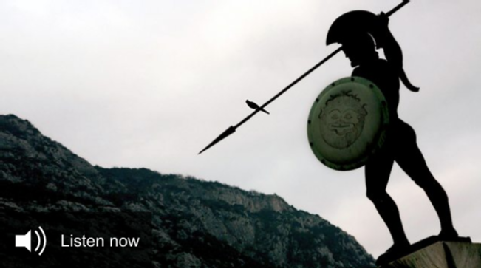Athens in the Age of Pericles, 462–429 BC Audiovisual Resources
The Athenian Empire
[Source: Introduction to Ancient Greek History with Donald Kagan]
The course 'Introduction to Ancient Greek History' is a series of lectures delivered by the great Donald Kagan to undergraduates at Yale and is an excellent and comprehensive overview of Ancient Greek history from the Bronze Age to the end of the classical period. Episodes 13-20 are of especial interest to this topic.
Pericles - Professor Edith Hall
In 431 BCE the Athenian statesman Pericles delivered one of the most influential speeches of all time, his Epitaphios or Funeral Oration. The occasion was at the funeral of the first Athenian soldiers to lose their lives in the Peloponnesian War. This lecture examines the history of this beautiful site, the momentous occasion on which Pericles spoke, and the ways in which his speech, recorded by the historian Thucydides who was present at its delivery, has informed subsequent epoch-making orations from Lincoln at Gettysburg to Kennedy and Obama.
Sparta
[Source: BBC Radio 4 - In Our Time]
Melvyn Bragg and guests Paul Cartledge, Edith Hall and Angie Hobbs discuss Sparta, the militaristic Ancient Greek city-state, and the political ideas it spawned.The isolated Ancient Greek city-state of Sparta was a ferocious opposite to the cosmopolitan port of Athens. Spartans were hostile to outsiders and rhetoric, to philosophy and change. Two and a half thousand years on, Sparta remains famous for its brutally rigorous culture of military discipline, as inculcated in its young men through communal living, and terrifying, licensed violence towards the Helots, the city-state's subjugated majority. Sparta and its cruelty was used as an argument against slavery by British Abolitionists in the early 1800s, before inspiring the Nazis in the 1930s and 1940s.Yet Sparta also produced poets of great skill: Tyrteaus wrote marching songs for the young men; Alcman wrote choral lyrics for the young women. Moreover, the city-state's rulers pioneered a radically egalitarian political system, and its ideals were invoked by Plato. Its inhabitants also prided themselves on their wit: we don't only derive the word 'spartan' from their culture, but the word 'laconic'. Paul Cartledge is AG Leventis Professor of Greek Culture and a Fellow of Clare College, University of Cambridge; Edith Hall is Professor of Classics and Drama at Royal Holloway, University of London; Angie Hobbs is Associate Professor of Philosophy and Senior Fellow in the Public Understanding of Philosophy at the University of Warwick.
The Acropolis from Above
[Source: BBC Ancient Invisible Cities]
Fly above the Acropolis - a sacred hill in the heart of Athens with the Parthenon on its peak. Beside it is a smaller temple known as the Erechtheion. It's named after Erechtheus, a mythical king of Athens. The ancients believed that the Gods Athena and Poseidon once walked here. Step inside and you can find out how it was specially designed to preserve the sacred mythology of Athens. The Erechtheion is an enduring monument to the ancient history of this extraordinary city.
The Parthenon Sculptures
[Source: The British Museum, Published on 15 Jul 2014]
Playwright, author and British Museum trustee, Bonnie Greer celebrates the enduring beauty and humanity of the Parthenon Sculptures.
The Battle of the Sexes in Ancient Athens
Talk by Alistair Blanchard at the University of Warwick.

